What’s in Your Shed? visits a Lancashire beef farm
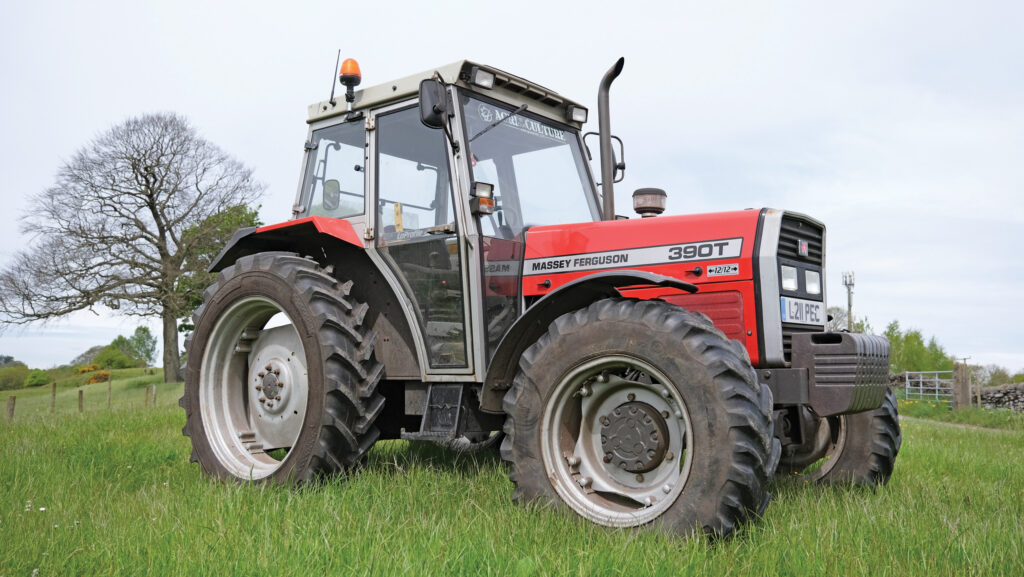 The Tomlinson's best tractor - Massey Ferguson 390T © James Andrews
The Tomlinson's best tractor - Massey Ferguson 390T © James Andrews Simple and reliable classic Massey Fergusons are the tractors of choice for Lancashire beef farmers Jonathan and Ed Tomlinson.
We head over to their farm in Bolton to delve further into their farm kit.
See also: Driver’s view: Massey Ferguson 5S.135 Dyna-4 tractor
Farm facts
J Tomlinson, Bolton, Lancashire
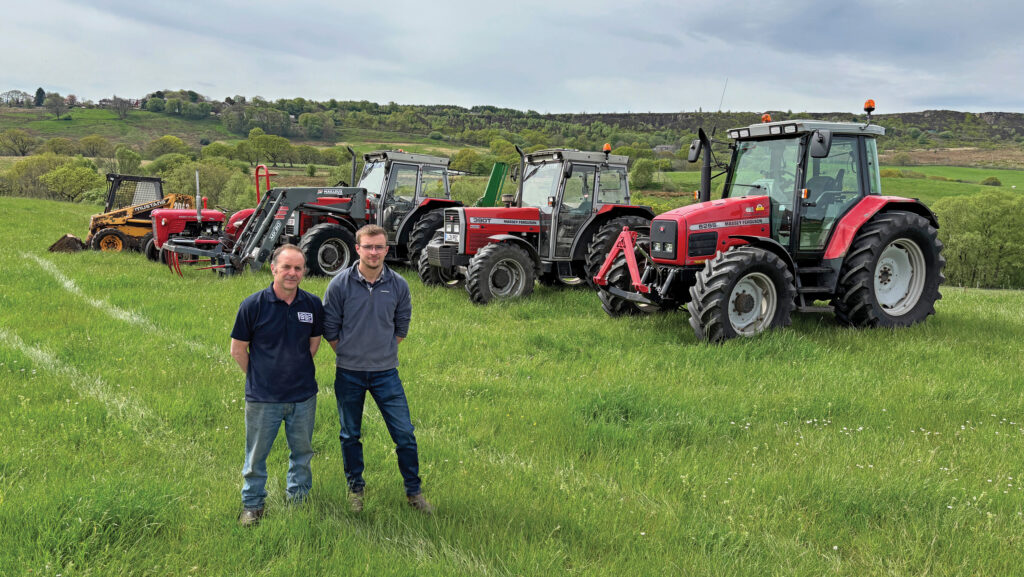
The Tomlinsons © James Andrews
- Size: 12ha
- Livestock: 22-head Shorthorn suckler herd
- Other: Jonathan has a milk round, Ed works for McCormick dealer John Charnley & Sons, and George runs his own contracting business
- Staff: Jonathan, Ed and brother George – all part time
How did you get started?
Jonathan: I’m the third generation to farm here and had a dairy herd until 2000, with the milk processed and delivered to local homes and businesses.
I kept the round when we moved to suckler beef – getting the milk from the dairy we used to use – and I’m still doing it to this day.
We’ve farmed more ground in the past, renting blocks of land here and there, but they were very fragmented and there was so much competition from horse livery that we’re now concentrating on the land we own.
It works as we’ve all got other incomes – Ed works full time in the parts department for John Charnley & Sons, and George has his own contracting business.
We’ve recently moved away from Limousin-crosses to Shorthorns and we’re working toward making this a high-health herd.
The cost to switch was so high that we dropped our numbers, but we’re gradually working our way up to 30 or 35.
How brand loyal are you?
Ed: We’ve always been loyal to Fergie and that’s unlikely to change anytime soon. Ours are simple, easy to fix and hold their value so there’s not much of an incentive for us to swap.
All in, it costs about £60 plus oil to service one of our 390s and it takes no time at all. It’s mad when you consider a service kit for some Fendts is about £2,500 these days.
Clearly new tractors are out of the question for us now – the M-reg 390T was the last, which cost £22,000 in 1994.
At one point the value dropped to about £8,000, but they’re now more like £18,000. We’ve actually just increased the value on our insurance to make sure we’re properly covered.
Favourite dealer?
Ed: Charnleys obviously makes the list as I work there, it’s handy and there’s a huge range of Sparex and Vapormatic parts to choose from.
But we also get on well with TH Horn at Garstang – where our Krone kit came from – and PV Dobson, which we use for genuine Massey parts.
Favourite piece of kit?
Jonathan: Implement wise, it would have to be the Krone four-rotor tedder.
We’d had a succession of Haybobs before which used to throw the grass around in lumps and this is just so much smoother.
It’s also got a headland mode that adjusts the angle so we don’t lose any grass in the bottom of hedges.
Ed: The Mustang 2042 skid-steer also deserves a mention. It hadn’t had an easy life before it got here so looked rough and we knew the engine needed serious attention.
But we thought we could get it going so bought it for £2,000. As soon as it was in our yard, we got the engine out, took the head off and realised it had two cracked pistons.
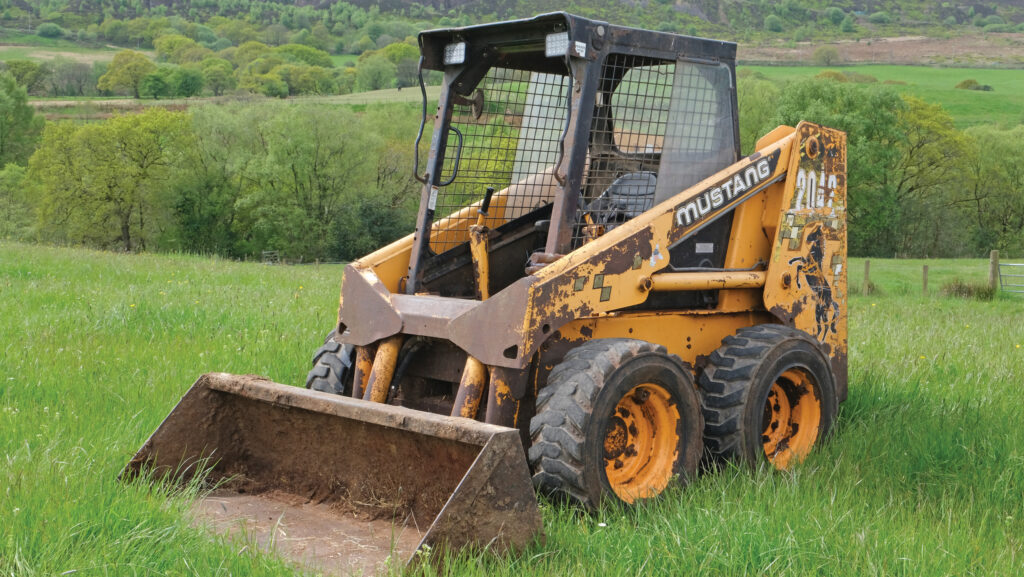
Mustang 2042 © James Andrews
We didn’t have time to tackle that, so got someone to rebuild it for us and slotted it back in.
Since then, we’ve used it almost every day for feeding, mucking out and general yard jobs, and it’s been brilliant.
There are still a few niggles – the fuel gauge doesn’t work, there’s a leak on one of the axle seals and the paintwork could do with a tidy up – but they’re pretty minor.
We’re planning to give it a bit of a birthday soon and sort some of these bits out.
Least favourite?
Jonathan: Before our Krone mower we had a 9ft JF Stoll mower conditioner that was awful.
Not only was it heavy and numb, but it was troublesome, particularly when it came to the gearbox. On one occasion it packed up and the friction set it on fire – sadly not enough though, so we had to fix it.
Ed got hold of a second-hand gearbox and once we’d got it back together we packed it off to an auction.
We also had a Lely Lotus for rowing up, which had aluminium tine supports. These weren’t strong enough and the tines had a habit of hitting the cage, so we’d end up with a twisted pile of scrap to try and repair.
Latest purchase?
Jonathan: It’s a Nugent 14x6ft flatbed trailer with sides, which is a very useful piece of kit. It’s also built like a tank and far stronger than an Ifor Williams equivalent.
The reason we bought it is that we’ve already got one of their stock trailers and have been really impressed. It’s virtually rattle-free, tows well and the opening flap at the front seems to make cattle easier to load.
How long do you keep your machinery?
Ed: The tractors are very much here for the long haul, but we do try and update some implements before they get too tired.
We aim to get something new or nearly new every year, even if it’s very small, which keeps things fresh and means we’re unlikely to have to replace several machines all at once.
That said, there’s still plenty of old kit knocking around.
In the shed
Tractors: Massey Ferguson 6265, 390T x2 (one with MX80 loader), 35 and 185
Grass kit: Krone R240 mower, Vendro 560 four-rotor tedder, Lely Hibiscus 421 single-rotor rake, New Holland BR560 round baler, McHale 991 wrapper, Massey Ferguson 20 conventional baler, Browns flat-eight sledge
Other: Mustang 2042 skid-steer loader, Protech P180S post knocker, Quickfencer, Logic weed wiper, Griffiths 21ft bale trailer, Amazone ZA-U 1001 fertiliser spreader, Tad-Len 12m sprayer, Marshall MS-60 muckspreader, McHale bale splitter, Nugent livestock trailers and flatbed trailer
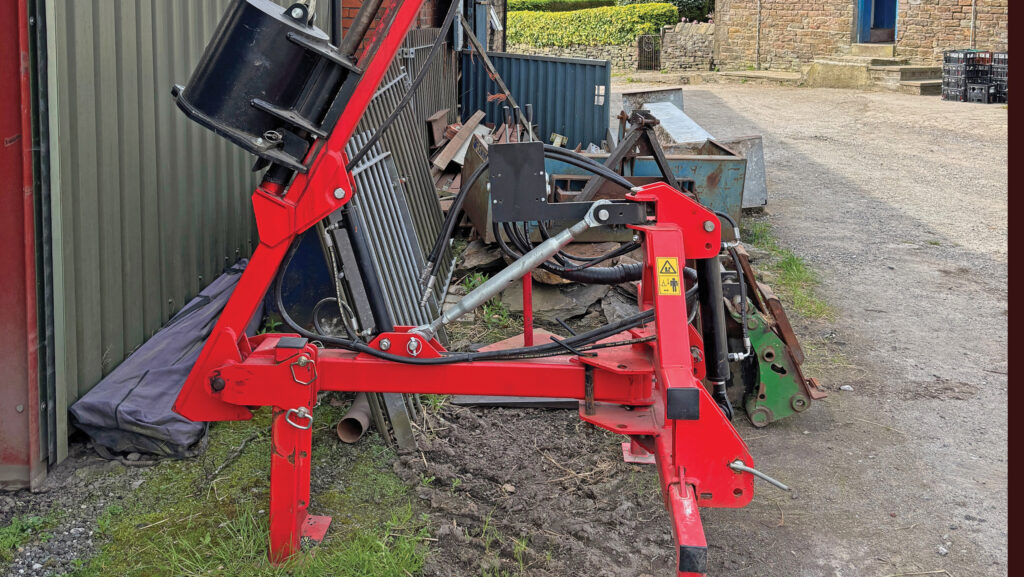
Protech post knocker © James Andrews
Next on your wish list?
Our 3m Opico grass harrows are 20 years old and they’re shot, so we’d like some replacements.
Part of the problem is that we swapped the original 7mm tines with 8mm ones as they kept breaking.
This did the trick, but we think it put too much strain on the tine bars which are now starting to crack – two have snapped off completely.
Ideally, we’ll go for 4m folding versions this time, but we’re not sure which brand. Maybe Einbock or Joskin.
Most expensive repair bill?
Nothing outrageous, but we have had to put clutches in both of the 390s which set us back about £1,100 apiece.
Oldest machine still at work?
Jonathan: It’s probably the Massey 35 which was bought new in 1962. It was the main tractor back then, but these days it gets used for odd jobs such as towing the weed wiper.
It’s always gone well, but it’s put in some hours over the years and has had a couple of engine rebuilds.
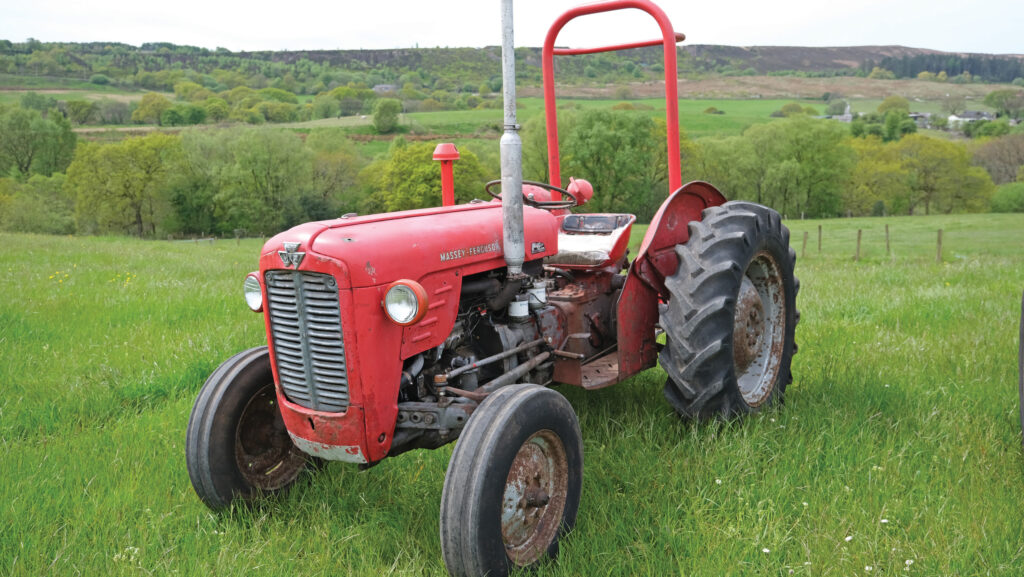
Massey Ferguson 35 © James Andrews
Our Massey Ferguson 20-8 baler is probably next in line and is another tool that’s still working well. We did have a hiccup a while ago though, when we baled a wooden peg that broke one of the needles.
Thankfully, we had a spare at the back of the shed, which we fitted and then painstakingly checked we’d got the timing right. It did 300 bales the season after and didn’t miss a knot.
Most overpriced spare part?
Ed: We priced up an oil seal kit for the Mustang – basically a bag full of O-rings – and were quoted £400 by Manitou.
That was out of the question, so I looked on Bepco and I reckon we can get the two we need for about £4 each.
Biggest machinery mistake?
We haven’t had any major mishaps here – things only seem to go wrong when you go somewhere else or you’re borrowing a machine.
A while ago I was using a friend’s West trailer to cart some grass, but I hadn’t realised the hook was worn and it popped off the hitch when tipping. Thankfully, no serious damage was done.
We also had a front axle oil seal pop out on the 6265 as the previous owner had put gear oil in there rather than 10W 30.
As the axle is unvented, this caused pressure to build up that had to go somewhere – it cost us £500 to fix.
Best invention?
Jonathan: We’re more focused on repairing and servicing kit that someone else has made, but we’ve constructed a couple of sheds out of old steel and we made a reeler for unwinding land drainage pipe.
This uses the three-point linkage-mounted frame from our old scraper and has a carousel from an AFT trencher. It’s simple but makes the job far easier.
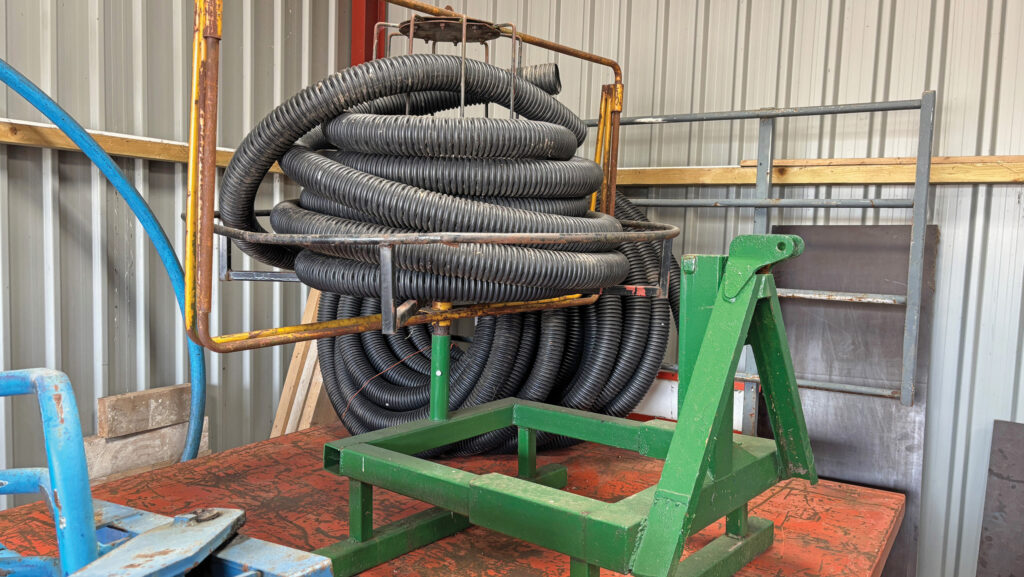
Drainage pipe unroller © James Andrews
What couldn’t you live without in the workshop?
We recently bought a Draper plasma cutter as we were getting fed up with the faff of gas bottles. It only cost £250, but it’s been a brilliant.
Another good buy has been our SIP inverter arc welder – it works well and you can carry it around with a shoulder strap.
What’s your everyday transport?
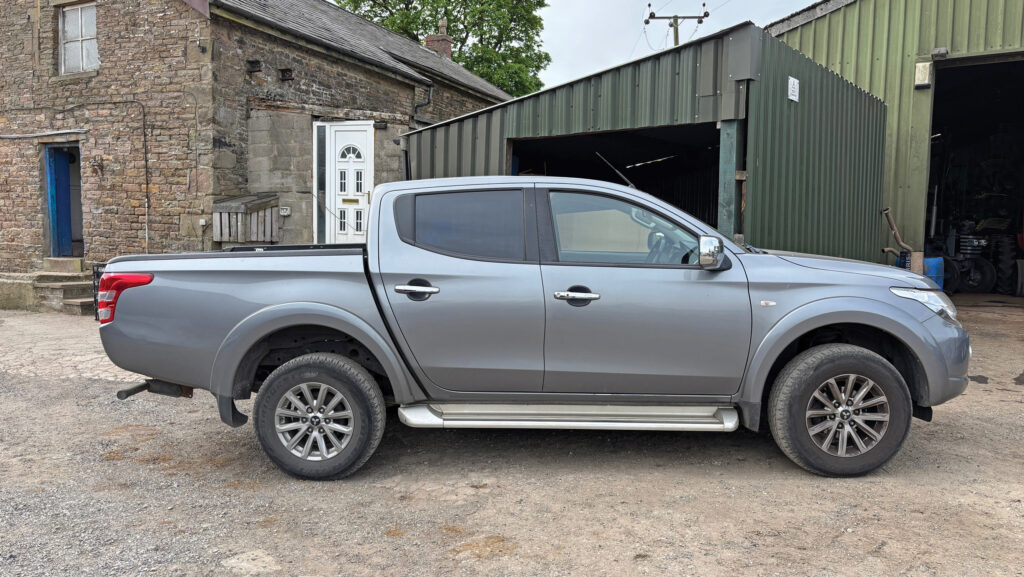
Mitusbishi L200 © James Andrews
It’s a 2018 Mitsubishi L200 that’s on 89,000 miles, most of which have been clocked doing the milk round.
There’s plenty of power on tap and it’s comfortable to drive but, because it does a lot of low-speed driving, we have had problems with the DPF struggling to regen.
Each time this happens it goes into the dealer to be sorted and it has an oil change while it’s there – it gets two or three of these a year.
Best tractor you’ve had?
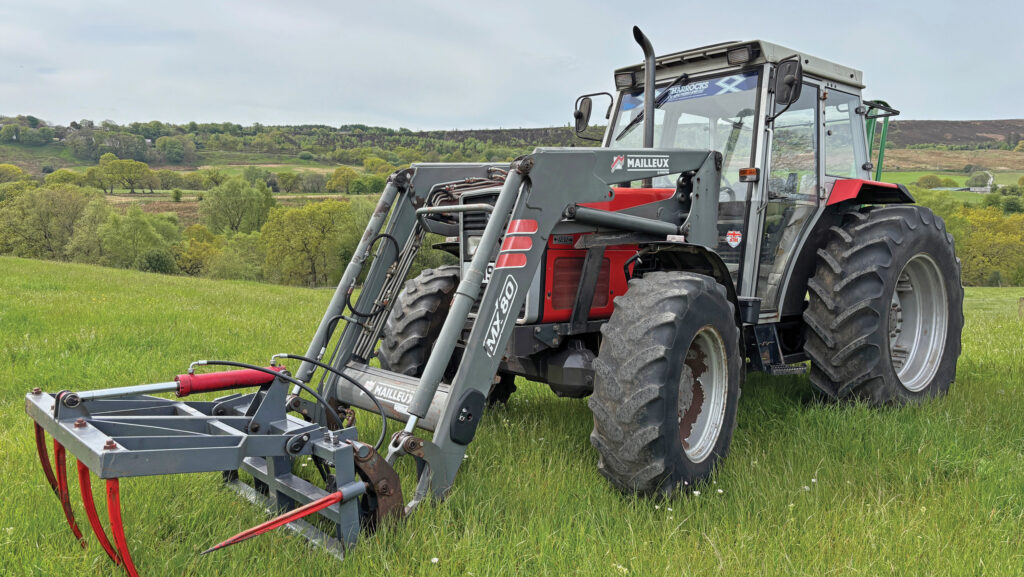
Massey Ferguson 390T loader tractor © James Andrews
Hands down it’s the L-reg 390T, which we bought second hand.
On paper, it’s the same as our original M-reg, but it came from a different dealer originally – Whittinghams at Garstang – which was notorious for playing around with the power.
It flies as a result and must be putting out at least 100hp. It’s now done about 6,250 hours and the only noteworthy repair has been the clutch, which is fair wear and tear.
And the worst?
We haven’t had any really bad ones, but we used to own an MF 3060 that we never really liked.
The engine was disappointingly flat and the transmission wasn’t great, particularly the awkward splitter button on the side console. The cab was great though, and well ahead of its time.
Current workshop projects?
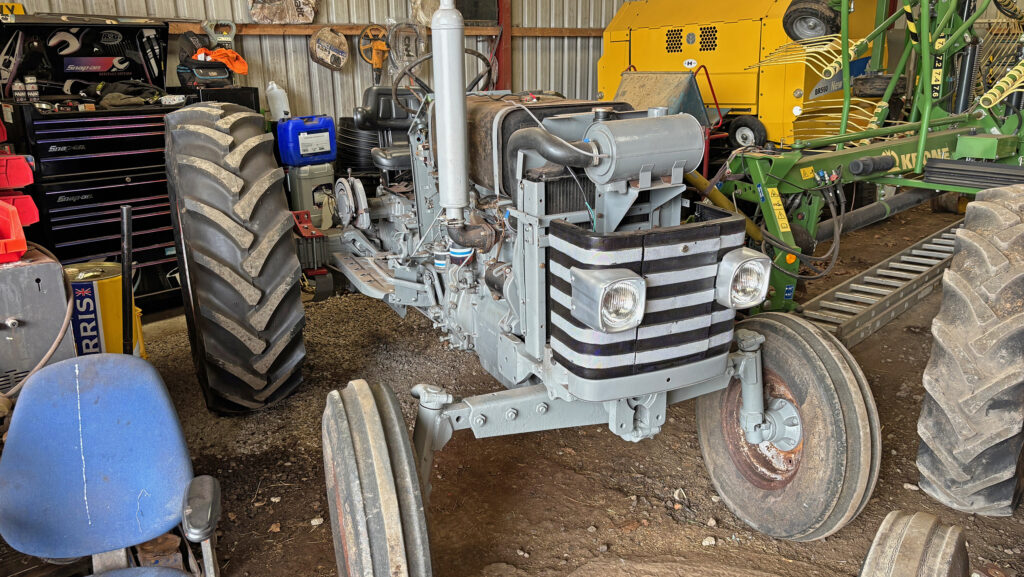
Massey Ferguson 185 © James Andrews
Ed I recently acquired a Massey Ferguson 185 that had been stood in a local dairy farm’s collecting yard for years.
It has seen plenty of muck in its time and the cows had been rubbing against it so the bodywork was rough. But it was mechanically sound, so I bought it for £4,000.
I’ve already stripped it down, resprayed the engine and castings and fitted a new set of wheels and link arms. That just leaves the bodywork to complete.
There won’t be any awards for originality – it’s been done on a budget with bits I could find for decent money – but it’ll be smart and usable.
Most surprisingly useful feature on a machine?
It’s not really a surprise, but a forward/reverse shuttle is the one thing we really miss on the 390s.
We’ve got one on the 6265 and it is a bit of a treat when you drive it after being in a 390.
Most pointless piece of technology?
We don’t have much need for any modern technology – we’re all about keeping things simple and cost effective.
GPS might be nice for spreading fertiliser or spraying the grass, but we’ve got that many poles, trees and landmarks there are plenty of reference points to work off.
Biggest machinery bargain?
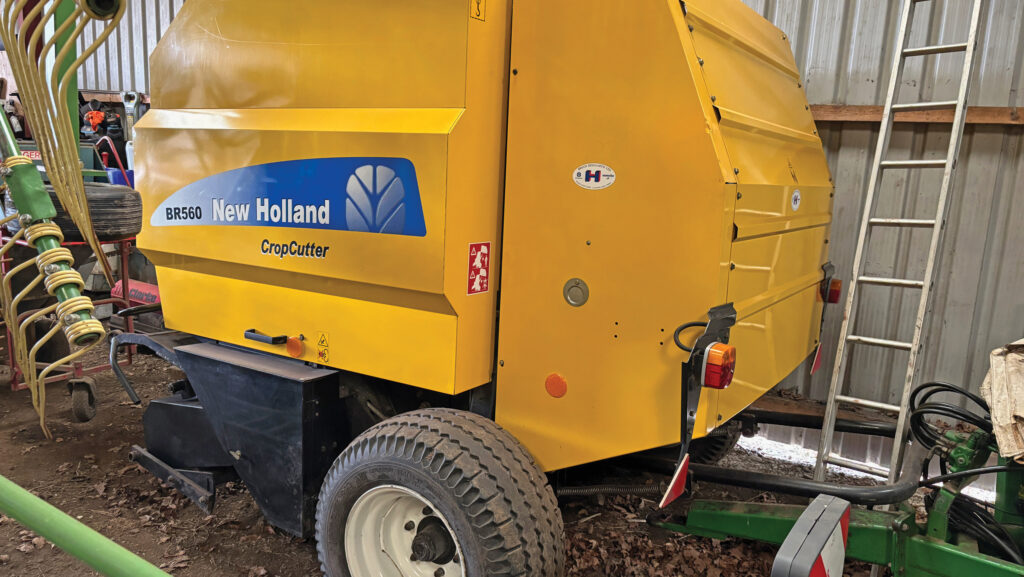
New Holland BR560 baler © James Andrews
Jonathan: The New Holland BR560 Cropcutter round baler is probably the best new deal we’ve ever had as we paid just £12,300, which was 60% of the retail price.
We bought it at the Garstang Show in 2006 and it was a stock machine that they clearly wanted to move on. It was a brilliant buy, it makes a nice bale and it has never given us any problems.
Biggest bugbear?
We try and keep all our machinery under cover, which means they’re slotted in pretty tightly.
The idea is that we put the kit we’ll need first nearest the front, but it never works out like that, so we spend far too much time shifting it around.

